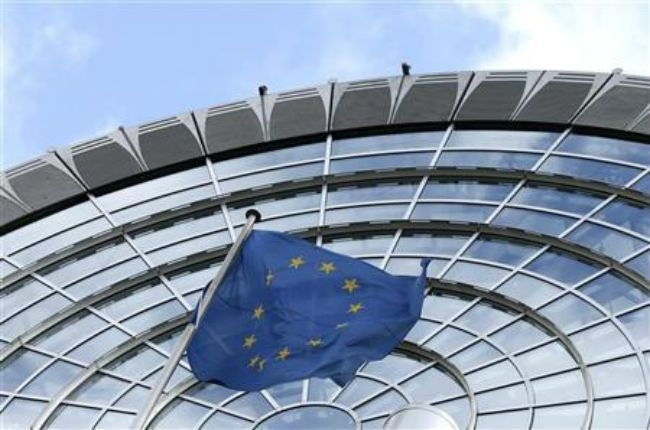
The European Union may have won the Nobel Peace Prize this year, but to many EU leaders, officials, diplomats and even journalists, it can feel more like a torture chamber.
Increasingly, Europe is governed at night by leaders in an advanced state of exhaustion, disregarding scientific evidence that this can lead to bad decisions, or non-decisions.
Over the past three years, the EU has held 25 summits to try to tackle its debt crisis and related economic turmoil, with few of those meetings ending before 3 or 4 a.m. -- usually after 12 hours or more of near-fruitless negotiation.
Add to that more than 40 finance ministers' meetings -- the most recent of which ended at 5 a.m. on Wednesday, again without agreement -- and it is easy to see how a set of institutions designed to foster peace and stability in Europe can end up delivering frustration, angst and head-numbing pain.
"I'll put it this way: I woke up at 5 a.m. or 5.30 a.m. yesterday and we ended in the morning around 4 a.m.," Slovak Prime Minister Robert Fico complained after the last, largely unsuccessful summit in October.
"This is how all of us operate, we adopt very serious decisions under pressure," he said, referring to the EU's increasingly weary heads of state and government.
The EU's 27 leaders gathered for another summit on Thursday and Friday, this time to try to hammer out an agreement on around 1 trillion euros ($1.3 trillion) of spending over the next seven years.
It promises to be a bruising clash of national interests rather than the model of reconciliation and harmony commended by the Nobel committee, although it will still be "jaw, jaw" rather than "war, war".
Gatherings to negotiate the long-term budget only happen every 6 or 7 years and are notorious for running over deadline and for being extremely hard-nosed and ill-tempered affairs.
Former British Prime Minister Tony Blair described his experience of it in 2005 as the most difficult negotiation he handled while in office -- tougher even than the 1998 Northern Ireland peace talks that led to the Good Friday agreement.
Already EU officials are warning that these budget talks could run into Saturday and Sunday -- making it what is known in diplomatic circles as a "four-shirt" summit.
Staff at the European Council in Brussels, where EU leaders meet, have been told to be ready to work into Saturday at least. British Prime Minister David Cameron has cleared his schedule for the entire weekend, a spokesman said. French President Francois Hollande has done the same.
Journalists -- around 1,500 of whom are accredited to cover the meeting -- took up residence in the vast glass and steel entrance hall on Thursday morning and will stay encamped there until a deal is done, or negotiations break down.
The effect on the EU's public image among its 500 million citizens is unedifying.
"It's not exactly glamorous and some would say it's downright torture," said one EU diplomat, a veteran of at least 30 EU summits. "Everyone gets extremely fed up."
Sweden has organized extra bedding for its diplomats to take a rest in their delegation room if necessary.
BAD-DECISION MAKING?
The larger issue, though, is whether the pressure-cooker atmosphere and endlessly drawn-out negotiating schedule is conducive to good decision-making.
Everyone knows that drivers should take a rest after four or five hours at the wheel to avoid accidents. Shouldn't the leaders of nation states take the same precaution lest they take a bad decision that might run their country off the road?
A study published by three academics in the Proceedings of the National Academy of Sciences in the United States last year showed that a judge's willingness to grant parole can depend to a large extent on how tired he or she is and when they last ate.
The study examined more than 1,000 parole decisions made by experienced judges over a 10-month period. It found that the more decisions judges have to make, the more difficult it becomes to stay consistent -- they get decision fatigue.
"The theory determines that decision-making capacity is a limited resource, and when many decisions are made in sequence, the mental capacity diminishes," Professor Shai Danziger of Ben-Gurion University, one of the authors, said at the time.
That could be a lesson for EU leaders and the political advisers, diplomats and hangers-on who have to help them make the right decisions time and again for days in a row.
One experienced EU ambassador, a veteran of multiple foreign postings in high-pressure places, said a lesson could be drawn from how Israel handles Middle East talks.
When the Oslo peace accords were being negotiated with the Palestinians in the mid-1990s, Israel would change its negotiating team every six hours or so to avoid fatigue and the risk of mistakes.
"No one can negotiate at full capacity for more than six hours at a time, you just can't concentrate that long," the ambassador said. "They wanted to make sure they had a fresh team that was at its sharpest."
China has employed similar tactics in business and trade negotiations, officials say.
By contrast, EU leaders will have at least 12 straight hours of negotiation on each of the next two days and more if the meeting drags on into the weekend.
And if that isn't enough, there's another meeting of finance ministers starting on Monday evening.
© Thomson Reuters.




